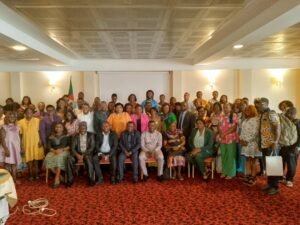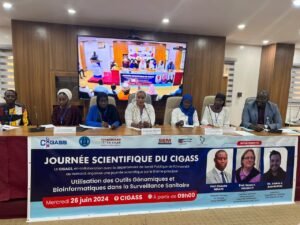The Cameroon Network of Associations of People Living with HIV/AIDS, known by its French acronym as RéCAP+, organized on November 2, 2023, an annual evaluation meeting on the Community Led Monitoring project.

On Thursday, November 02, 2023, in Yaounde, the Cameroon Network of Associations of people living with HIV/AIDS, known by its French acronym as RéCAP+, gatheredclose to 40 officials, leaders of civil society organizations, and media men within the framework of its annual evaluation meeting of the Community-Led Monitoring (CLM) project.
According to the staff monitoring the project, several strides were recorded in 2023. The Community Led Monitoring project contributed to improving access to and quality service in health facilities; reduced wait time for services; enhanced supply of facilities with commodities; new patients were put on antiretroviral drugs; confidentiality issues were resolved in some health facilities and some staff were motivated financially by the management of health facilities.
Gildas Djome, CLM’s Project Manager made an in-depth presentation of results, and key indicators and highlighted some recommendations underscored by beneficiaries during field evaluation and interviews.

It was disclosed that 7284 of 7666 questionnaires were administered to health personnel; 326 health facilities were targeted;169 sites monitored effectively took part in data collection; 138 health districts were covered and over 60% of beneficiaries interviewed are from female sex aged between 35 to 39 years.
Speaking at the kick-off of the one-day meeting, Jean Jules Kamgue, Executive Director of RéCAP+, said the CLM project is an open way to have all the feedback of activities carried out on the field. According to him, this project is quite crucial. It helps to channel the numerous complaints of populations and health personnel in general.
In his introductory note, the Executive Director of RéCAP+ stressed on the fact that, the organization he leads is out to accompany the government in its health policy, and through the CLM project there is a keen follow-up of actions implemented by the State.
Jean Jules Kamgue praised the positive records in terms of patients’ feedback which are greatly contributing to the CLM project.
With the effective implementation of the CLM project, he said patients can appreciate the services offered by the State, and the type of drugs at their disposal and denounce some malpractices observed in some hospitals.
He said: “Our wish today, with the implementation of the Universal Health Coverage (UHC), is to intensify the Community Led Monitoring project. We have to be sure that patients are given the right treatment free of charge or at the rates stated by the government. Take, for instance, the dialysis sessions today for someone who is enrolled in the UHC phase I will just spend 15.000 FCFA a year whereas before patients used to spend 520.000 FCFA a year. As community agents therefore have to monitor this action and see if the rate of 15.000FCFA is respected in hospitals offering dialysis.”

While exchanging with media practitioners, the Executive Director of RéCAP+, Jean Jules Kamgue emphasized the change of mindset as concerns the perception people have of HIV/AIDS patients and its treatment in Cameroon.
“As community agents, there is a critical look we have to put at the forefront. That of, changing the perception of HIV/AIDS in our communities. The problems of stigmatization and discrimination persist and this is a great hindrance to treatment in our health facilities and in our communities in particular. The elimination of HIV/AIDS does not only end at the level of finance, there is a need to change the mindset and looks people have on this disease. We need to have under the spotlight influencing personalities living with HIV/AIDS, to carry the flag for more sensitization on this disease. This will greatly influence people affected and our population to look at the disease in another way…” He added.
On her part, the Coordinator of the CLM project, Rose Sangong gave an overview of the program that has been running in Cameroon since 2021.
She said: “The community-led monitoring project is a mechanism that helps to improve access to health care and the quality of health services offered at the level of health facilities. Thanks to the support of USAID and the American people we have been able to implement this mechanism since 2021 in Cameroon.”
She went further to highlight the positive notes of the CLM project compared to 2022 despite some ill practices that entangle the process.
“For this year a lot of positive changes have been observed at the level of health facilities. When it comes to elevating barriers to access to care, there has been a good level of improvement as far as confidentiality is concerned and equally, the number of no payment for free services has greatly reduced. We have 3% of people complaining that they paid for a free service. Whatever be case the case, we noticed that it is due to some malpractices at the level of some personnel and it might not necessarily be the policy of the health facility in question but that of some individuals.”

Mrs. Sangong Rose added: “The rate at which people are informed, that is the knowledge of health personnel on the user fees’ policy and that of service users have greatly reduced and we talk today of 99% of knowledge for health personnel and over 87% for beneficiaries. When beneficiaries know, it permits them to demand for services, know their rights, and denounce certain malpractices. We were able to bring up to over 41 persons who lost the follow up back to treatment thanks to the CLM, and also the follow up of clients has greatly been improved thanks to continuous assistance and contribution of the CLM.”
As concerns challenges, CLM’s project Coordinator decries some loopholes that are in one or another affecting the effective implementation of the project.
“The big challenge we encounter in monitoring the user fee policy remains the late reimbursement of health facilities’ bills and the stockouts of commodities. Without these two elements, it will be very difficult for this policy to be implemented at 100%. At one point in time, the health facility might want to implement the policy but because they don’t have stocks or finance to purchase some of these stocks, they might turn to implement malpractices. In a nutshell, there has been a great improvement this year compared to last year. And this year, there have been positive changes. We can document positive changes, specific changes in at least 75 health facilities compared to practically 50 we had last year.” She narrated.
Rose Akabe, Coordinator of the International community of women living with HIV in Central Africa was one of the participants at this meeting. At the end of the session, she saluted the giant steps which the project has registered so far. She said thanks to the CLM project, patients are more informed about their rights to health care and can voice out in case of poor treatment. Rose Akabe believes the project is a great relief to some malpractices existing in some hospitals and wishes it goes a long way for the well-being of patients especially those living with HIV/AIDS. She stated the fact that, compared to previous years, a patient can now request a service that he knows is free of charge.

This one-day meeting was equally another occasion to encourage people, to get massively enrolled in phase I of the Universal Health Coverage.
Dr. Noudji Simon, Chief of the communication section for UHC said as time passes by people are enrolling themselves. And with regard to statistics, close to 2.900.000 persons are already pre-enrolled, and about 1.600.000 persons are effectively enrolled in phase I of this program.
Dr Noudji said: “Phase I of the Universal Health Coverage is not a philosophy it is a reality. We always take advantage of such panels to recall the importance of enrolling in the program. And on behalf of our hierarchy, we wish to outline the fact that everything is effective in the UHC. We can say for instance, the consultation of children aged between 0 to 5 years which used to be paid for, but now it will be free of charge in all health facilities if the child is enrolled in the UHC phase I…We should not forget our brothers and sisters who are affected with HIV, if enrolled benefit from antiretroviral drugs free of charge”
For recall, the CLM project implemented by the Cameroon Network of Associations of People living with HIV (ReCAP+), is aimed at reducing HIV infections and transmission, ensuring all HIV-positive beneficiaries are retained in care, and to improve on the health and well-being of children living with/ and affected by HIV.
The project received a grant of (USD $1.4 million) that is, 780.470.000 FCFA from the United States Government.
Elise Kenimbeni





